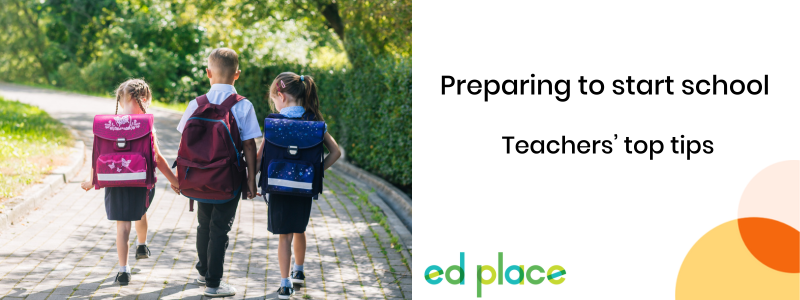
Tips to help prepare your child for starting school
Ah…a new year at a new school. For many of us (now grown!) the words conjure up memories of posing for photos in crisp new uniforms by the front door, and that unmistakable nervous/excited energy of feeling like a ‘grown up’.
When it comes to your own child it’s a whole new adventure, whether you’re preparing for them to start reception, or they are part way through their academic journey and you’re in the throes of helping them transition into year 7.
It can be a daunting time for both you and your child, so EdPlace’s teachers have pulled together some tips to help you both smash those first few weeks!
Who are EdPlace? They’re your partner in education! EdPlace is here to help your child succeed in English, maths, science and the 11 plus. We offer assessments, activities and personalised online tuition from year 1 - GCSE and all the milestones in between. Smash the back-to-school period with our teacher-created assessments, designed to give you a broader understanding of your child’s current strengths and areas for focus - perfect for the start of a new school year!
Starting primary school
1. Talk about the upcoming change
Little people are very resilient and it is often us adults who are more anxious about the step up to big school! To help ease any anxieties that they may have, make space to have a chat about what they might expect to change. Talk about their teachers, get them to try on their uniform, walk past the school gates together or look at some photos on the school’s website to help them get their head around it all!
2. Encourage their independence
Help your child with becoming as independent as they can be with self-care activities so they don’t need to rely on adult support. The things that will really help them in school are being able to:
-
Take off and put on their shoes
-
Use the toilet
-
Wash their hands
-
Wipe their nose
-
Feed themselves
-
Be able to open/close their water bottle and lunch box/bag
-
Zip up their coat
3. Support their communication skills
Children are often able to begin playing together and immediately become friends. However, if your child is a bit shy around lots of new people, have a chat with them about how they might manage this.
You could role play some different scenarios at home (who doesn’t love playing ‘schools’?!) and practise asking things like:
“Hello. My name is….What is your name…?”
“Excuse me, do you know where the toilets are?”
“Can I play with you?”
“Please can you help me with…?”
4. Have some fun with ‘mark making’
Teachers aren’t going to expect your child to arrive with them being able to write. However, they will be encouraging ‘mark making’, which is essentially making any mark on paper that has some meaning. For example, they might draw what looks to you like a big scribble, but they can tell you exactly what animal it is and what it is doing in the picture!
The more ‘mark making’ they do now, the easier they will find beginning to learn to write.
5. Talk about their day
Have you ever noticed that your child responds with “I can’t remember” when you ask them anything about their day?! A nice way to get the conversation flowing is to ask them specific questions, for example:
“Who did you sit with at lunch today?”
“What story did your teacher read?”
“Did you enjoy doing football in P.E?”
Perhaps just asking one of these questions will give you that little insight into their day that you’re longing for!
6. Work out where they need support - EdPlace can help!
It’s always helpful to know what your child needs so you know how best to support them. Some children have a great understanding of numbers but need help with letters. It could be the other way round for others.
Once they’re fully in the swing of learning, some students may benefit from EdPlace’s online key stage 1 assessments and activities. These are great for students who enjoy a challenge and, later in the year, can also help prepare your child for the transition to year 1.
7. And finally…what about you…?
That first drop off can be an emotional one as you wave your baby off into the big wide world. Make a plan for you that morning - book in a coffee with a fellow parent, head to the gym or get stuck into some work! Whatever you do, remember it is very normal to feel all the feels, and know it will only be a few hours before you can give them a big squeeze while they excitedly tell you all about their first day.
Starting secondary school
1. Build a bond
It’s important that you also build a bond with your child’s secondary school. Get to know the names of key staff now, join the school’s social media and browse through some of the events the schools have such as concerts, trips, and sports days. Share pictures with your child and get excited with them!
2. Nurture future friendships
Help settle your child socially by helping them form connections with students going to the same school. Make a play date where they can start discussing what they think Secondary School might be like and it will give you a chance to discuss your ideas with parents in a similar position. Parent friendships like this might be crucial when you need to double-check the date of sports day or clarify if your child needs cake ingredients for the next day!
3. Keep them reading!
Helping your child foster a love of learning and growing their curiosity will help them succeed in all their subjects. Keep them reading over the summer to ensure they keep practising their literary skills and have an open and receptive mind to all the wonderful things they will learn about in KS3.
4. Encourage Independence
Teachers at Secondary School may expect your child to be more independent than they were at Primary School. Could you help prepare them for this by giving them a little more independence at home? Maybe they could make lunch for the family? Or organise a film night for their friends?
5. Offer Ownership
Give your child ownership and the chance to build excitement by allowing them to make some decisions. Allow them to choose a pencil case, a reading book to start the new term with or even what their first lunch will be. Taking ownership provides a sense of responsibility and control over your environment so if your child is starting to feel apprehensive about all unknowns, these little elements of ownership can prove reassuring.
6. Oversee Organisation
Organisation is key. There will be many more subjects and teachers and more homework at Secondary School and it is a great idea to support your child in preparing for this. Perhaps you could set up a homework station in your house full of the necessary stationery and equipment for completing awesome homework? Or maybe you could create a poster of all the different subjects your child will be studying, leaving space for them to write in the names of their new teachers?
7. Support home learning with EdPlace
Remember, we’re here for you too! EdPlace has back-to-school assessments that can help your child prepare for the next step up in their education. If your child feels they need additional practice in a certain area before they embark on KS3 classes, why not browse our worksheets? Or if you are merely wanting to warm up their brains for the academic challenge of KS3 EdPlace worksheets are a great place to start. The feedback provided is clear so you will be able to easily monitor their improvement in these subjects.
This is such an exciting time in your child’s life, whilst you are busy helping your child to prepare, remember also to take a moment and appreciate how proud you are of them. We wish you all the best for this fantastic year ahead. Enjoy it – you got this!







